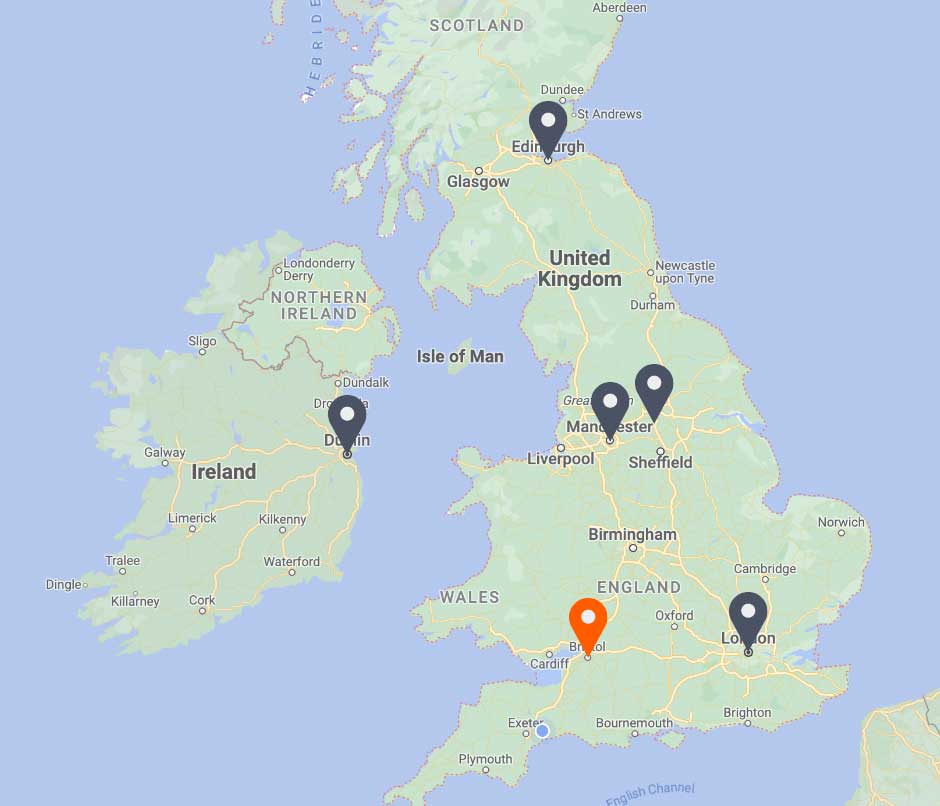THIS ARTICLE AT A GLANCE
CONTACT ETS
If you have any questions or would like to discuss further what you should be doing, ETS is here and willing to help.
Call 0117 205 0542
Email enquiries@energy-ts.com
Submit a contact form
CHECK OUR SERVICES
A Green Economic Recovery – The Built Environment, Net Zero and Data

Will it be different this time around?
For those of us that have worked in the built environment sustainability sector for some time, it could feel as if we’ve been here before – a significant disruption to the economic status quo, followed by much shouting from the rooftops by select sectors of Business and Industry about the opportunity to harness fiscal stimuli to tackle recovery in a way that makes a positive impact to jobs, resilience and, crucially, the environment.
We have also heard platitudes from Governments in response before, with broad statements of intent in this area – and some progress has been made, but it has seemed to many to be piecemeal, frustratingly incremental and to lack sufficient teeth to really kick-on with the agenda in a way that provides the much-needed step change demanded by the science around climate change.
This has generally been followed by action from a few enlightened leaders, with the remainder of industry being dragged along by regulatory changes as and when they occur – which is understandable, given the legally-binding fiduciary duty of Board of Directors to ‘promote the success’ of their companies, typically interpreted as financial performance over the short term!
Recessions are an inherent feature of our capitalist economy – we have been though them before and we will go through them again. The real question is whether the climate debate has now gathered sufficient momentum and critical mass to be an unavoidable and urgent issue that prompts real, material and game-changing action by Government.
It’s tempting to say not – that we will again see good intention and high-profile speeches, but scant impactful change.
And yet, there are glimmers of hope – the recently announced £3bn investment by the UK Government into ‘green projects’, the Green Jobs Challenge Fund, and the weight being put behind the ‘Build Back Better’ policy responses to COVID-19 across the OECD member states. On the face of it, these seem to be more than the mere ‘drop in the ocean’ interventions we’ve seen previously.
This, coupled with a thoroughly engaged generation that is now becoming the primary economic demographic demanding change, and the absolute cacophony of businesses committing to Net Zero targets, either aligned to or ahead of the UK’s own 2050 target, seems to indicate a real change of attitude and unavoidable agency pushing forward the agenda.
Could we be on the cusp of something many of us have been working for decades for? At ETS, our fingers are so firmly crossed that we’re nearing the point of loss of circulation!
The role of the Built Environment and, crucially, data!
Any Green Economic Recovery simply cannot ignore the opportunities available across the built environment.
Again, without wanting to go over old ground – it is well known that the role the built environment plays in national and international carbon emissions is huge, and that tacking energy inefficiency across both the residential and commercial sectors provides an enormous chance to make a significant dent in emissions.
We’ve also seen the regs changes that have so often been the only thing that would actually drive any improvement – EPCs, DECs, MEES, S63, ESOS, SECR – and the building assessment methodologies supporting planning requirements and forward-thinking developers – BREEAM, CEEQUAL, LEED, SKA; all fun acronyms, and some of them have indeed been met with fanfare and chorus across the sustainability sector.
But it is the formal commitments being made to Net Zero that are providing real hope. Undoubtedly, some of this will be more greenwash put out with a sufficiently distant target date that those CEOs and teams making the promises won’t actually be the ones that have to do anything about it….. but one gets the gut feeling that this insincerity is scarce.
On that basis, and the hope that this gut-feeling is right, a huge number of businesses will need support in the short term to explore and baseline the reality of their current approach to energy and carbon management, clarify their thinking and motivations in regard to the ‘Net Zero’ carbon agenda, and identify the right pathways to realise the full range of opportunities available to them across their operational portfolios – including both the ‘art of the possible’ and specific areas to stretch their ambitions.
What is clear though, is that without detailed and granular insight into building performance across individual assets and entire estates, not only will it be nigh-on impossible to develop achievable strategies and implementation plans, but it will also be hugely challenging and costly to drive change and measure progress.
You can’t manage what you don’t measure – and to press-on towards a Net Zero target without access to the right detailed information across your portfolio, the process will be costly and any progress painfully slow – and ultimately your overreliance of offsets will mean that achievement of the target is merely a financial cost, without any of the vast operational improvements or financial overhead savings that were available to your business actually be realised.
How ETS can help
ETS has strong experience in assisting portfolio and Property Managers to drive robust and effective energy management and efficiency programmes across large national and international portfolios.
As a data-led Energy Management and Engineering consultancy, carbon performance is a key element of all our work with our clients – and we have a very strong track record of assisting our clients to significantly reduce energy consumption, carbon emissions and cost, whilst improving the operational resilience of their portfolios.
The ETS approach is one of pragmatism – we develop strategies and plans that are ambitious yet practical, based on our long standing ‘real-world’ energy management & engineering experience – whilst bringing the very latest full market suite of Smart Building technologies into play. In this vein, our strategic work would be based on a ‘Smart’ approach to Net Zero.
If you need assistance on your journey to Net Zero, then please do get in touch with us and. No matter the size or nature of your building, or how big your property portfolio is, we can help.
Final thoughts
If you are looking for an energy management system that is tailored to your business needs, ETS can provide you with 25 years of experience in dramatically improving energy efficiency and reducing environmental impacts. Whether your businesses have individual assets or large international portfolios, ETS can assist you in saving substantial amounts of money while significantly reducing your carbon performance.
To discuss your requirements, get in touch. You can contact us by calling 0117 205 0542 or drop us an email at enquiries@energy-ts.com.
Related Article
8 Ways Businesses Can Reduce Energy Use in the Workplace This Winter
Discover how to comply with ESOS Phase 4 and unlock energy-saving opportunities for your business. This guide explains the requirements, highlights key deadlines, and provides actionable strategies. Learn how energy audits, tailored action plans, and expert support can reduce costs, improve efficiency, and align your organisation with sustainability goals.
ESOS Action Planning: Complying with Phase 4 and Implementing Energy Saving Strategies
Discover how to comply with ESOS Phase 4 and unlock energy-saving opportunities for your business. This guide explains the requirements, highlights key deadlines, and provides actionable strategies. Learn how energy audits, tailored action plans, and expert support can reduce costs, improve efficiency, and align your organisation with sustainability goals.
Important Update: What You Need to Know about ESOS Phase 3
Time is ticking for the ESOS Phase 3 deadline. The Environment Agency announced that the reporting system is available now. For organisations qualifying for ESOS Phase 3, the deadline for submitting a compliance notification is 5 June 2024, and organisations should still look to meet this compliance notification deadline where possible.









































































